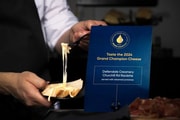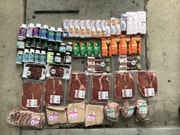Measles alert: Infant's visit sparks cross-border outbreak concerns
By
Seia Ibanez
- Replies 12
Once thought to be nearly eradicated in many developed countries, measles has made a disturbing comeback, ringing alarm bells nationwide.
A recent urgent health alert was issued for a highly contagious measles case in Sydney involving an innocent nine-month-old baby.
This highlighted the potential for infectious diseases to cross borders and spread through communities.
The infant who had recently returned from Asia, where there had been an outbreak of measles, visited several locations in Sydney's inner west and southwest upon return, potentially exposing numerous individuals to the virus.
Among the identified locations is the Five Star Coffee and Nuts grocery on Yerrick Rd in Lakemba, which the infant visited on 12 January between 3 pm and 5 pm.
NSW Health has been proactive in managing the situation, identifying and contacting people in close contact with the infant to arrange preventive treatment if required.
Dr Leena Gupta, Sydney Local Health District's Clinical Director of Public Health, reassured the public that the identified location posed no ongoing risk.
However, she urged people who had visited the Lakemba grocery during the specified time to be vigilant for symptoms.
‘(They) include fever, sore eyes and a cough, usually followed three or four days later by a red, blotchy rash that spreads from the head to the rest of the body,’ Dr Gupta said.
'It can take up to 18 days for symptoms to appear after an exposure.'
See the statement below:
Measles is a vaccine-preventable disease, spread through the air when someone who is infectious coughs or sneezes.
The most effective and safe protection is the common measles-mumps-rubella (MMR) vaccine, which is included in the National Immunisation Program (NIP) for children between 12 and 18 months.
It is also free in NSW for anyone born during or after 1966 who hasn't already had two doses.
'This should be a reminder for everyone to check that they are protected against measles, which is very infectious,' Dr Gupta said.
'Anyone born during or after 1966 needs to ensure they have received two doses of measles vaccine.’
‘This is particularly important prior to overseas travel, as measles outbreaks are occurring in several regions of the world at the moment.'
The incident echoed a similar scare in July last year when a man unknowingly infected with measles travelled through Melbourne and Brisbane airports.
In September last year, WA Health issued a health alert for locals after a person infected with measles returned from Bali and spread the virus to multiple individuals over two weeks. The infected individual spent more than two hours in Meekatharra and at shopping outlets in the southern region of Perth.
According to Federal Department of Health Care data, the immunisation coverage rate for all Australian children at five years stands at 94.04 per cent.
 Have you checked your immunisation status recently? Share your thoughts and experiences with us in the comments below.
Have you checked your immunisation status recently? Share your thoughts and experiences with us in the comments below.
A recent urgent health alert was issued for a highly contagious measles case in Sydney involving an innocent nine-month-old baby.
This highlighted the potential for infectious diseases to cross borders and spread through communities.
The infant who had recently returned from Asia, where there had been an outbreak of measles, visited several locations in Sydney's inner west and southwest upon return, potentially exposing numerous individuals to the virus.
Among the identified locations is the Five Star Coffee and Nuts grocery on Yerrick Rd in Lakemba, which the infant visited on 12 January between 3 pm and 5 pm.
NSW Health has been proactive in managing the situation, identifying and contacting people in close contact with the infant to arrange preventive treatment if required.
Dr Leena Gupta, Sydney Local Health District's Clinical Director of Public Health, reassured the public that the identified location posed no ongoing risk.
However, she urged people who had visited the Lakemba grocery during the specified time to be vigilant for symptoms.
‘(They) include fever, sore eyes and a cough, usually followed three or four days later by a red, blotchy rash that spreads from the head to the rest of the body,’ Dr Gupta said.
'It can take up to 18 days for symptoms to appear after an exposure.'
See the statement below:
Measles is a vaccine-preventable disease, spread through the air when someone who is infectious coughs or sneezes.
The most effective and safe protection is the common measles-mumps-rubella (MMR) vaccine, which is included in the National Immunisation Program (NIP) for children between 12 and 18 months.
It is also free in NSW for anyone born during or after 1966 who hasn't already had two doses.
'This should be a reminder for everyone to check that they are protected against measles, which is very infectious,' Dr Gupta said.
'Anyone born during or after 1966 needs to ensure they have received two doses of measles vaccine.’
‘This is particularly important prior to overseas travel, as measles outbreaks are occurring in several regions of the world at the moment.'
The incident echoed a similar scare in July last year when a man unknowingly infected with measles travelled through Melbourne and Brisbane airports.
In September last year, WA Health issued a health alert for locals after a person infected with measles returned from Bali and spread the virus to multiple individuals over two weeks. The infected individual spent more than two hours in Meekatharra and at shopping outlets in the southern region of Perth.
According to Federal Department of Health Care data, the immunisation coverage rate for all Australian children at five years stands at 94.04 per cent.
Key Takeaways
- An urgent health alert has been issued in Sydney after a nine-month-old with measles visited several locations in the inner west and southwest.
- NSW Health has identified and contacted those who have been in close contact with the infant to offer preventive treatment as needed.
- Symptoms of measles to be aware of include fever, sore eyes, a cough, and a red, blotchy rash spreading from the head to the rest of the body.
- Public health officials urge people to ensure they are protected against measles by receiving two doses of the measles-mumps-rubella (MMR) vaccine, which is free in NSW for those born during or after 1966 who haven't had two doses.








